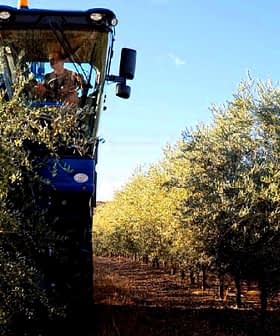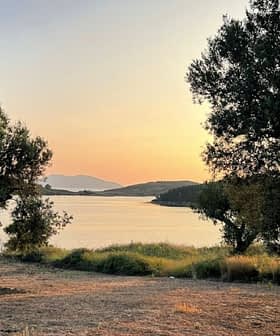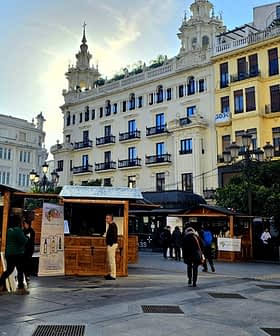Thousands of Spanish farmers took to the streets in March for the second time in as many months to demand changes to European agricultural policy and an end to the United Nations’ Agenda 2030 environmental program.
According to Luis Cortés, coordinator of the Union of Unions of Farmers and Ranchers, which organized the protest, “there were about 150 tractors and 2,000 protesters” present.
Farmers have been facing a myriad of struggles: falling sales prices, rising costs, heavy regulation, powerful and domineering retailers, and the difficulty of competing with cheaper imports from outside the E.U.
Tractors lined the streets of Madrid, taking the route from Paseo del Prado, past the Ministry for the Ecological Transition and the Demographic Challenge and northwards through Paseo de la Castellana to the Ministry of Agriculture, Fisheries and Food. The protest was peaceful.
“Families and children participated, getting into the tractors. It was a festive day,” Cortés said. “Our objective was to win this war with the administrations that do not understand us and don’t want to. We also need support from citizens who are also consumers.”
See Also:Agricultural Groups Call on Spanish Government to Step Up Climate Change Response“We wanted them to know that to consume quality products, it is essential that they support the Spanish countryside and farmers,” he added. “Our way of life is in danger of disappearing due to unaligned policies, and we risk importing products from other countries.”
Farmers continue to demand more flexibility, less stringent environmental regulations, and lighter bureaucracy from the European Union’s Common Agricultural Policy (CAP), which decides on the requirements for farmers’ subsidies.
“The farmer protests have highlighted core issues in the agri-food supply chain and industry,” said Gonzalo Urcolo, the co-founder and chief executive of CrowdFarming, a platform that connects consumers directly to organic farmers.
“Farmers are not only frustrated because the E.U. is imposing restrictive measures on agriculture,” he added. “They are frustrated because politics only regulates part of the supply chain.”
“European governments are creating a system that regulates how farmers should grow, but not where and at what price the big supermarkets should buy,” Urcolo continued. “As a result, Europe is less and less able to supply its citizens from its production.”
Farmers’ frustration has been boiling over for months, with similar protests in France, Germany and Brussels, the administrative capital of the E.U.
“Farmers have been facing a myriad of struggles: falling sales prices, rising costs, heavy regulation, powerful and domineering retailers, and the difficulty of competing with cheaper imports from outside the E.U., all while facing a changing and unpredictable climate,” Urcolo said.
“The protests are showing the world that things need to change, and we need to rethink each stakeholder’s responsibility in this transformation and the place of farmers in our society,” he added.
Urcolo said that he founded CrowdFarming as part of the solution, allowing organic farmers to cut out the intermediaries and sell directly to consumers who share their values.
He added that many of the 280 farmers using the platform have similar complaints to those protesting in Madrid.
“Due to the difficult circumstances, more and more farmers are showing an interest in alternative sales channels,” Urcolo said.
While he disagrees with efforts to roll back the sustainability requirements enshrined in the latest iteration of the CAP, Urcolo believes the transition could be handled differently.
“We are not against E.U. rules; on the contrary, most farmers at CrowdFarming are either organic or in the process of converting to organic and, therefore, are aligned with a transition towards a more sustainable agri-food system,” he said.
“If done well, they can be very helpful in encouraging a green transition,” he added. “We just need to ensure that they are incentivizing farmers instead of suffocating them and providing them with the support they need to ensure that we are moving in the right direction.”
Urcolo believes that part of this support must come from structuring free trade deals with third-party countries that do not disadvantage European farmers.
“If it is cheaper to produce outside Europe, then we need to continue importing our products from third countries so that lower-income families in Europe do not lose purchasing power and can afford to buy food,” he said.
However, protestors at demonstrations in Ireland and France voiced their concern that European regulations drive up production costs for goods that, as a result, are then cheaper to import from elsewhere.
They specifically protested the proposed E.U.-Mercosur free trade deal, which would remove tariffs on agricultural exports from Argentina, Brazil, Paraguay and Uruguay to the E.U. and vice versa.
European farmers argue that they follow stricter environmental controls than their South American competitors and are specifically worried about an influx of cheaper beef, dairy and soy.
“We need to start developing environment-centric measures to co-exist with the financial ones,” Urcolo said.
He cited the need for European rules to favor European producers when certain fruits or vegetables are in season, even if cheaper imports could come from abroad.
“It could be cheaper in the short term, but it has a huge environmental impact, not just because of the long-distance transportation and food waste during transport, but also the waste of the E.U. produce that would not be harvested,” Urcolo said.
He added that trade deals should also consider E.U. prohibitions on certain types of phytosanitary products, arguing that if they are not allowed in the bloc, then exporters to Europe should also be prohibited from using them.
“Climate-centric decisions should be aligned with monetary-centric decisions because the negative effects of climate change will inevitably impact the financial world as well,” he said.
Urcolo pointed to olive oil as a prime example. After consecutive poor harvests fueled by extreme weather and persistent drought in the Mediterranean basin, olive oil prices have reached historically high levels. While some of this is natural market behavior, Urcolo warned that speculation was increasingly occurring.
“Olive oil production has seen some tough challenges in the last few years,” he said. “At CrowdFarming, together with our farmers, we had to adapt to the current situation, in which olive oil production was heavily reduced and market prices skyrocketed. The industry has started to become increasingly speculative, losing some of its true value.”









